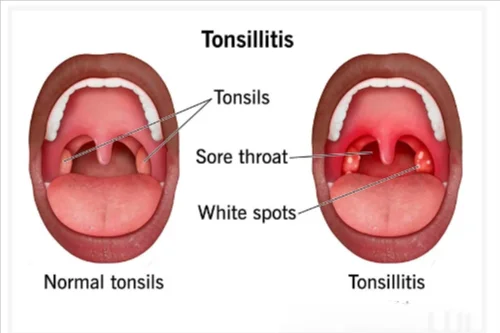Tonsilltis
Tonsilltis

Tonsillitis is the inflammation or infection of the tonsils — two oval-shaped glands at the back of the throat that help fight infections. Tonsillitis can be caused by viruses or bacteria, and it’s common in children, though adults can get it too.
People with tonsillitis often experience a sore throat, difficulty swallowing, swollen tonsils, fever, and swollen lymph nodes in the neck. In some cases, white or yellow patches may appear on the tonsils, and the voice may sound muffled or “thick.”
Common Signs and Symptoms Of Tonsillitis
- Sore throat and pain when swallowing
- Red, swollen tonsils (sometimes with white spots or pus)
- Fever and chills
- Bad breath
- Ear pain or neck tenderness
- Headache or tiredness
Treatment for Tonsilltis
- Mild cases (usually viral) : Managed with rest, plenty of fluids, saltwater gargles, pain relievers, and throat lozenges.
- Bacterial tonsillitis (such as strep throat) : May require antibiotics prescribed by a doctor.
- Recurrent or severe cases : If tonsillitis keeps returning or causes complications like breathing difficulty, a tonsillectomy (surgical removal of tonsils) may be recommended.
What Causes Tonsillitis?
- Viruses : Like those that cause the common cold or flu.
- Bacteria : Especially Streptococcus (strep throat)
- Allergies or irritants : Rarely, irritation from pollution or smoke can contribute
Tonsillitis can make eating, drinking, and even talking uncomfortable. If you or your child have repeated throat infections or severe symptoms, it’s time to consult an ENT specialist for the right care. Book your appointment today for relief and guidance.
